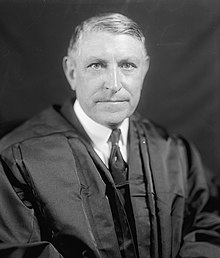
Back أوين روبرتس Arabic اوين روبرتس ARZ اوون روبرتس AZB Owen Roberts German Owen Roberts French אוון רוברטס HE Owen Roberts ID Owen Josephus Roberts Portuguese
Owen Roberts | |
|---|---|
 | |
| Associate Justice of the Supreme Court of the United States | |
| In office June 2, 1930 – July 31, 1945 | |
| Nominated by | Herbert Hoover |
| Preceded by | Edward Terry Sanford |
| Succeeded by | Harold Hitz Burton |
| 11th Dean of the University of Pennsylvania Law School | |
| In office September 1, 1948 – 1951 | |
| Preceded by | Earl G. Harrison |
| Succeeded by | Paul Brunton (acting) |
| Personal details | |
| Born | Owen Josephus Roberts May 2, 1875 Philadelphia, Pennsylvania, U.S. |
| Died | May 17, 1955 (aged 80) West Vincent Township, Pennsylvania, U.S. |
| Political party | Republican |
| Spouse |
Elizabeth Rogers (m. 1904) |
| Children | 1 |
| Education | University of Pennsylvania (AB, LLB) |
Owen Josephus Roberts (May 2, 1875 – May 17, 1955) was an associate justice of the United States Supreme Court from 1930 to 1945.[1] He also led two Roberts Commissions, the first of which investigated the attack on Pearl Harbor, and the second of which focused on works of cultural value during World War II.
Born in Philadelphia, Roberts graduated from the University of Pennsylvania Law School and pursued a legal career. After working as a district attorney in Philadelphia, he was appointed by President Calvin Coolidge to investigate the Teapot Dome scandal. After the death of Associate Justice Edward Terry Sanford in March 1930, President Herbert Hoover nominated John J. Parker to fill the vacancy on the court. The Senate rejected Parker and Hoover quickly nominated Roberts as his second choice for the vacancy. Roberts was easily confirmed and took his position on the court in May 1930.
On the Hughes Court, Roberts was a swing vote positioned between the conservative Four Horsemen and the liberal Three Musketeers. Along with Chief Justice Charles Evans Hughes, Roberts's vote often decided whether President Franklin D. Roosevelt's New Deal legislation would be upheld. His decision to uphold the constitutionality of a state minimum wage law in West Coast Hotel Co. v. Parrish has been called "the switch in time that saved nine". That term references the decision's possible role in the defeat of the Judicial Procedures Reform Bill of 1937, which would have expanded the Supreme Court and thus allowed Roosevelt to appoint Justices more sympathetic to his policies. Roberts's motivation for upholding the constitutionality of the New Deal and his role in the defeat of the bill remains a matter of debate.
Though the bill was defeated, Roosevelt's long presidency allowed him to appoint most of the court. By the end of Roberts's tenure, he was the lone Supreme Court Justice who was not appointed by Roosevelt.[a] He was one of three Justices, along with Robert H. Jackson and Frank Murphy, to vote against Roosevelt's orders for Japanese American internment camps in Korematsu v. United States as well as the lone judge to dissent in the case of Smith v. Allwright, which ruled white primaries unconstitutional. His relations with his colleagues on the Stone Court became strained and he retired in 1945. Roberts served as the Dean of his alma mater, the University of Pennsylvania Law School, from 1948 to 1951. He died in Chester County, Pennsylvania in 1955.
- ^ "Justices 1789 to Present". Washington, D.C.: Supreme Court of the United States. Archived from the original on February 15, 2016. Retrieved February 16, 2022.
Cite error: There are <ref group=lower-alpha> tags or {{efn}} templates on this page, but the references will not show without a {{reflist|group=lower-alpha}} template or {{notelist}} template (see the help page).
© MMXXIII Rich X Search. We shall prevail. All rights reserved. Rich X Search